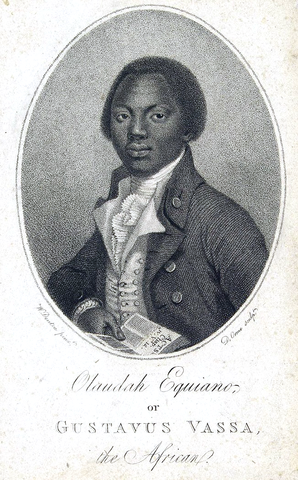In the 16th and 17th centuries millions of Africans were transported across the Atlantic and sold in America. Very few had the chance to describe their experience to the world. One who did was an African named Olaudah Equiano. He wrote an amazing autobiography
from freedom to slavery and back to freedom again.
Olaudah Equiano was born into a rich West African family in 1745. They lived far from the sea, in an area which is now part of Nigeria. Olaudah Equiano's father was a village chief. He had seven children and many slaves, so Equiano grew up
.
When he was eleven, Equiano
by African slave traders. He was alone at home with his sister when two men and a woman seized them and ran off with them to the nearest woods. Equiano and his sister
but their mouths were shut, and their hands tied.
The slave traders separated him from his sister and during the next months
from one African master to another. Finally, a wealthy widow bought him. She treated him well and even let him sit at the table with her and her son. Everything here made him forget
. One morning he was awoken and put on a slave ship that took him to America.
The journey from Africa to America was called "The Middle Passage." It was the middle leg of the triangular slave trade
in Europe. Three or four hundred Africans were packed into the ship’s cargo deck which was very small. You couldn't even stand up in it. The air was hot, and the smell of human bodies was unpleasant.
Disease and death were common. Up to 25 percent of a slave ship's Africans
. The captain and crew fought to keep their valuable cargo alive. They made the Africans dance on deck for exercise. Sometimes they forced the slaves to eat , so that they wouldn’t die.
When the slave ship carrying Olaudah Equiano and hundreds of other Africans finally reached Barbados they were soon
. No one purchased Equiano, who was still just a boy. So, he was shipped north to a plantation in Virginia. His new owner was a lieutenant in the British navy named Michael Henry Pascal. He gave Equiano a new name, but the slave refused to be called by it. Under Pascal, Equiano learned to be a sailor. He spent much time in England, where he also managed
. He even fought for Britain in the Seven Years' War.
After a few years, Equiano had grown comfortable with his fate. So he was shocked once again when his owner sold him and he returned to the Caribbean where his new owner was a Quaker merchant from Philadelphia : Robert King. King treated Equiano well. But Equiano had tasted freedom and couldn't accept a slave's life anymore. His urge for freedom
when King put him to work aboard a Caribbean slave ship.
Equiano didn’t want to give up. He began trading glasses and other objects on the side. As time went on, he saved 40 pounds (equal to about $3,700 today) which was enough to purchase his freedom.
As a freeman, Equiano continued working as a sailor for years. He travelled a lot , but his personal struggle
continued. One day, a ship's captain decided to make Equiano a slave again. He was tied up with ropes around his ankles and wrists. Then white sailors put him on the mast where he hung all night long. In the morning, he begged
. The crew brought him down because his body was blocking the sails. . The ship's carpenter persuaded the captain to put Equiano ashore. There he thanked God for "this unexpected release" and found another ship that was heading to Jamaica.
He returned to England and
. In 1789, he wrote his autobiography, The Life of Olaudah Equiano. It was an immediate best seller— the first anti-slavery book to reach a wide audience. Equiano became England's leading speaker for blacks and the abolition of slavery.
Olaudah Equiano died in 1797. Ten years later, Britain and the United States abolished the slave trade.

Image: See page for author, Public domain,
via Wikimedia Commons